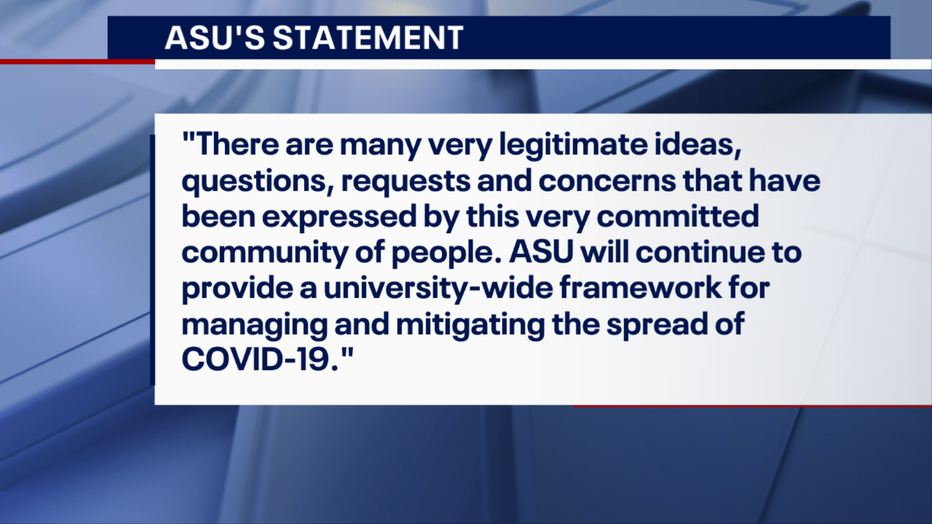Group urges ASU to reconsider plans to return to in-person learning
PHOENIX - A group that reportedly consists of members of Arizona State University community is urging university officials to reconsider plans to return to in-person learning.
In a statement released on the night of August 9, officials with a group called the ASU Community of Care Coalition say their members have signed an open letter urging ASU President Michael Crow and other university administration members to push back their plans to return to in-person learning for the Fall 2020 semester.
"The signatories believe that ASU's current COVID-19 mitigation strategies will not be adequate to prevent dangerous outbreaks of the virus at ASU and in the communities surrounding its campuses," read a portion of the statement.
In the statement, officials with the group say their members consist of more than 500 members of the ASU community, including various faculty, service staff, and graduate student workers.

Fall 2020 plans include various course options, testing regimen
President Crow announced a reaffirmation of plans for the Fall 2020 semester, in a statement published on the university's website on July 27. The plans have also been published on the university's website, with on-campus students being offered access to three learning environments, including on-campus, in-person courses, remote learning, and online, on-demand courses.
Classes with enrollment of 100+ students, according to university officials, have been moved to remote delivery only or have enrollment reduced by adding additional sections of the course. While many classes will include a blend of in-person or remote learning, some courses, such as labs, clinical experiences and certain fine arts courses, will only be available via on-campus, in-person courses.
Among other measures, university officials announced that testing will be made available for all students and employees, isolation space for students living on-campus who have tested positive for COVID-19, or exhibit COVID-19 symptoms, and requiring facial coverings at all ASU locations.
In addition, the university's October fall break has been cancelled.
Group questions plan's efficacy
In the statement released on August 9, officials with the ASU Community of Care Coalition say they do not believe the plans are adequate to prevent a COVID-19 outbreak at ASU. They also accuse the university of making decisions for Fall 2020 without faculty input.
"This is creating a learning environment that is both potentially unsafe and pedagogically unsound," read a portion of the statement.
According to ASU's academic calendar, the Fall 2020 semester is set to start on August 20. In a statement provided to FOX 10, university officials said, in part:
"ASU will continue to provide a university-wide framework for managing and mitigating the spread of COVID-19, which to the maximum extent possible empowers individual members of the ASU community to live, work, teach, research, and serve the people of Arizona in whatever ways best address the needs of each individual member of the ASU community."
Related
Social distancing standards in place as students move into ASU dorms
Students are moving into their dorms one by one as social distancing standards are being held at ASU during the pandemic.
Tune in to FOX 10 Phoenix for the latest news
Get the latest coronavirus news by downloading the FOX 10 News App. Our promise is that our alerts are there to inform you - not scare you.
On CoronavirusNOW.com, you'll find extensive coverage about COVID-19, including breaking news from around the country, exclusive interviews with health officials, and informative content from a variety of public health resources.
COVID-19 symptoms
Symptoms for coronavirus COVID-19 include fever, coughing, and shortness of breath. These, of course, are similar to the common cold and flu.
Expect a common cold to start out with a sore or scratchy throat, cough, runny and/or stuffy nose. Flu symptoms are more intense and usually come on suddenly, and can include a high fever.
Symptoms of COVID-19 may appear more slowly. They usually include fever, a dry cough and noticeable shortness of breath, according to the World Health Organization. A minority of cases develop pneumonia, and the disease is especially worrisome for the elderly and those with other medical problems such as high blood pressure, obesity, diabetes or heart conditions.
RELATED: Is it the flu, a cold or COVID-19? Different viruses present similar symptoms
COVID-19 resources
CDC Website for COVID-19
https://www.cdc.gov/coronavirus
https://espanol.cdc.gov/coronavirus/2019-ncov/index.html (In Spanish/En Español)
AZDHS Website for COVID-19
https://www.azdhs.gov/preparedness/epidemiology-disease-control/infectious-disease-epidemiology/es/covid-19/index.php#novel-coronavirus-home (In Spanish/En Español)


